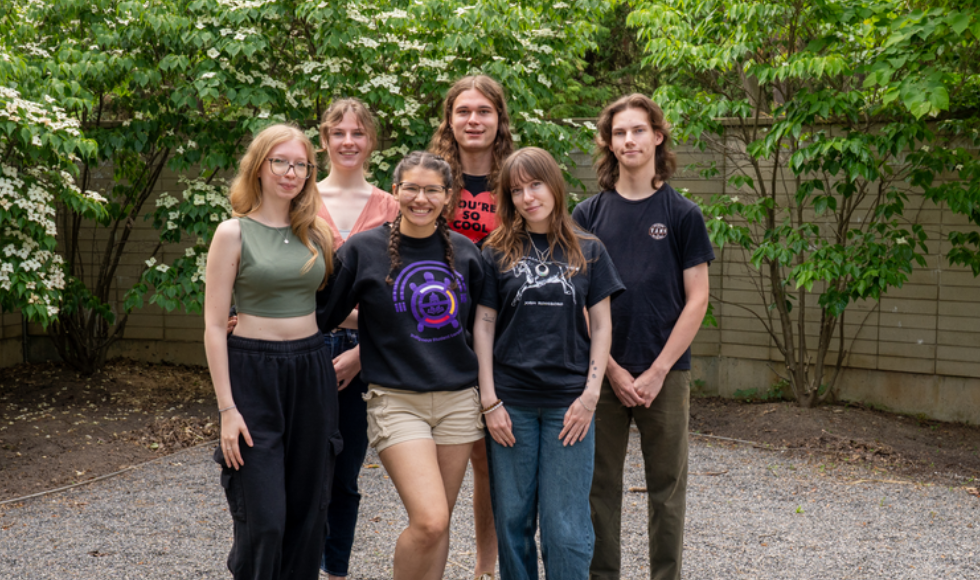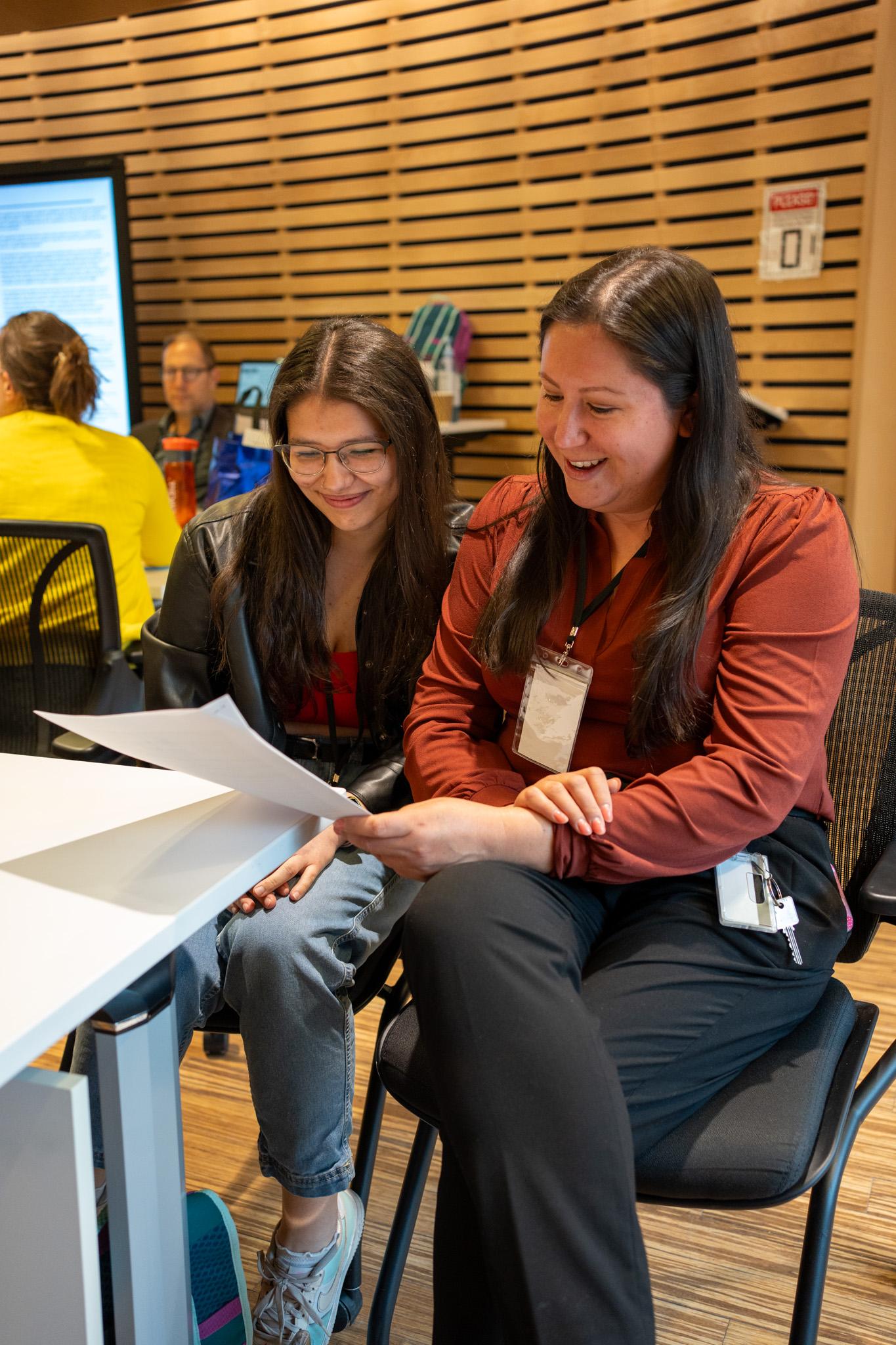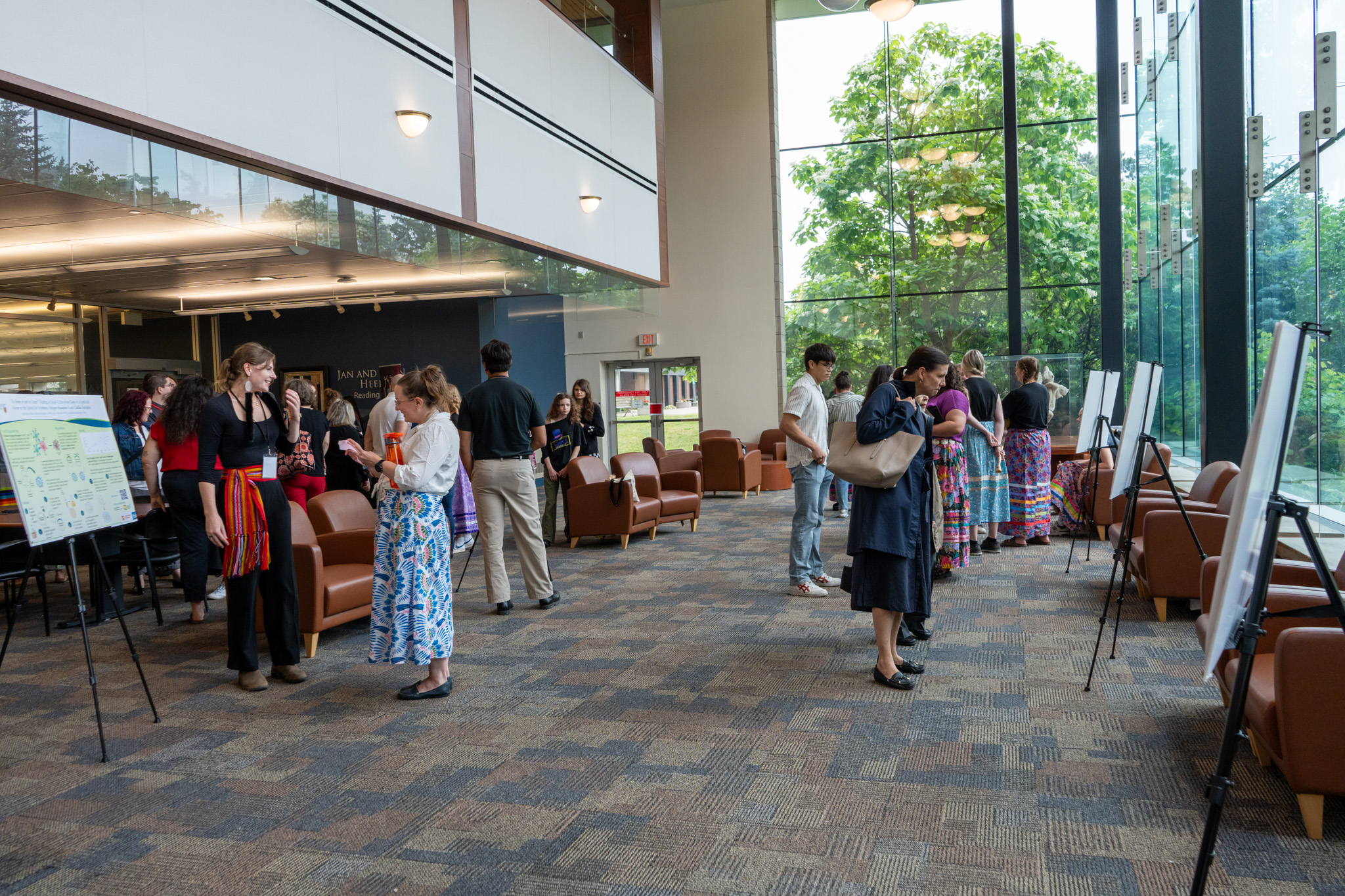IndigiNerds celebrates 10 years

Six of the 2025 cohort of IndigiNerds. The program welcomes Indigenous undergraduate students from across Canada for an eight-week summer research experience.
The IndigiNerds Research Internship program celebrated its tenth cohort of students this year, as it continues to inspire and support the next generation of Indigenous scholars.
The IndigiNerds program, run by the McMaster Indigenous Research Institute, welcomes Indigenous undergraduate students from across Canada for an eight-week summer research experience.
The program is unique in that it accepts students from a variety of disciplines and backgrounds, said program coordinators Justice Ryan and Elya Porter.

“Every year it’s different,” Ryan said. “Sometimes there’s a STEM heavy cohort, sometimes it’s social science, arts based. We’ve had students in music and physics and astronomy.”
Students are paired with supervisors who may not necessarily be in the same field of research; these interdisciplinary pairings are designed to encourage growth from both the students and supervisors.
The IndigiNerds program provides students with the preliminary skills and tools to embark on their research journeys, and to make more informed choices about graduate school.
 That can include knowledge synthesis and citation software training, scientific writing workshops, how to do a literature review, and time management and presentation skills.
That can include knowledge synthesis and citation software training, scientific writing workshops, how to do a literature review, and time management and presentation skills.
They also dive into topics like being Indigenous in academia, and how to apply to grad school and fund grad school.
“A really key aspect of this tenth year is having that solid foundation to now reach out and do even more community building from the program outwards,” said Ryan.
Last year, the program started a new partnership with the Canadian Cancer Society, and now has three to four dedicated spots for students interested in cancer research or harm prevention or reduction.
This summer they also worked with McQuesten Urban Farm, an Indigenous organization where IndigiNerds students would volunteer biweekly.
Students come from across Canada, and providing them with a sense of community is integral to their success, Ryan said. That comes in part from “getting connected with the land, getting connected with the people that live here.”
They’ve also fine-tuned the program to have a maximum of 10 students per cohort, allowing students to become a tight-knit group.
“We’re seeing students really thoroughly get into their research, but also have such a good friend group happening,” Ryan said.
These connections happen with people they might not have otherwise met, either because of geographical distance or educational silos. “And now they’re creating those relationships and developing amazing, interdisciplinary research.”

The IndigiNerds internship has had 163 participants to date. Many of them keep in touch; Porter and Ryan have recently started working on a survey to see where they are now, and what impact the IndigiNerds internship had on their research and graduate journeys.
“It’s been great looking back and seeing how many [of the participants] have now become doctors, lawyers, or are writing books, or have master’s [degrees],” said Porter.
“In the short time that we’ve been doing it, some of the alumni from our previous years, some who are even still in their undergraduate degrees, have told us that the program … connected them with research and opportunities that they never would have had otherwise,” Porter said. “It’s great to hear those types of things from our alumni.”
Check out the bios below to learn more about each of the IndigiNerds, and their research projects, from the summer 2025 cohort.
Jacob (Jake) Smith, Carleton University – Social Science (History & Theory of Architecture)
Supervisor: Charles de Lannoy, Department of Chemical Engineering, Faculty of Engineering
Project Title: “Co-Creation for Water Sovereignty on Six Nations”
Research interests: Incorporating Indigenous design approaches into architectural design.
What are you most enjoying about the IndigiNerds experience so far?
I came here to build up networking, trying to get out of my comfort zone, but the seminars have taught me a lot of things that are translatable: to work, school, even personal life. One that really helped me out was CV writing…. there’s a lot that can go into it and…the process to becoming a better student, better worker, and just kind of a better person all around.
Max Dewaele, University of Ottawa
Supervisor: Robert Cockcroft, Department of Physics and Astronomy, Faculty of Science
Project Title: “Landback, Skyback: Reclaiming the Land and Sky Through Indigenous Astronomy”
Research interests: Indigenous Studies, primarily gender and sexuality and how those can be understood in traditional practices, especially ceremonies
What are you most enjoying about the IndigiNerds experience so far?
It’s been so great just meeting other IndigiNerds and being able to connect with other Indigenous people who also share a passion for research and an interest in learning, both within academia but also in terms of traditional ways of knowing as well.
Alandra Ward, 4th year, University of Calgary
Supervisor: Jonathan Bramson, Department of Medicine, Faculty of Health Sciences
Project Title: “To Gene or Not to Gene? Trialing a Cocal-G Envelope Gene in a Lentiviral Vector in the Quest for Synthetic Antigen Receptor T Cell Cancer Therapies”
Research interests: clinical research involving traditional medicines, and incorporating them with Western ideologies.
What are you most enjoying about the IndigiNerds experience so far?
My favorite experience with the IndigiNerds has been getting to meet other Indigenous researchers and just kind of see what different things people are interested in researching and how many different avenues Indigenous research has nowadays.
Alexis Hachey-Brown, McMaster University
Supervisor: Jarita Greyeyes, Indigenous Studies Department, Faculty of Social Sciences
Project Title: “Exploring Barriers to Indigenous Student Services in Post-Secondary Education”
Research interests: experiences of Indigenous students who don’t access Indigenous Student Services, the gaps and barriers that exist for them, and how to get them into using services and into community.
What are you most enjoying about the IndigiNerds experience so far?
My favorite experience with the IndigiNerds so far would definitely be the community that we’ve built. I have gotten pretty close to everyone really fast. My favorite part has been just bonding over different research experiences and just kind of stressing together and also laughing together and just doing everything together has been a lot of fun.
Brody McLellan, Bachelor of Health Sciences (Honours), Faculty of Health Sciences, McMaster University
Supervisor: Jennifer Walker, Department of Health Research Methods, Evidence, and Impact, Faculty of Health Sciences
Project Title: “Unravelling the Relationships Between Colonial Violence, Gut Health, and Neurodegeneration Among Indigenous Populations”
Research interests in the future: Indigenous health and strengths-based approaches to health research.
What are you most enjoying about the IndigiNerds experience so far?
I think it’s a very nice environment and everyone’s very welcoming, which isn’t really something I expected, but it’s comforting to work in that sort of space.
Robyn Grix, 4th year, Department of Psychology, Neuroscience & Behaviour, McMaster University
Supervisors: Lori-Anne Davis Hill and Lyn Turkstra, School of Rehabilitation Science
Project Title: “Walking Two Paths: Indigenous Insights into Creating Culturally Safe Neurorehabilitation”
Research interests: acquired brain injury, communications disorders and Indigenous health.
What are you most enjoying about the IndigiNerds experience so far?
Probably the beading workshops and volunteering at McQuesten Farms. I’m taking the time during beading to learn how to make fringe earrings currently, so I’m super excited about that.
Ruby MacMillan, BSc Double Major in Biology and Psychology, University of Alberta
Supervisor: Niko Hildebrandt, Department of Engineering Physics, Faculty of Engineering
Project Title: “From Blood to Diagnosis: Tracing Endometriosis Through Molecular Clues”
Research interests in the future: neurodegeneration, and Indigenous medicines as treatments for cancer and other kind of health problems
What are you most enjoying about the IndigiNerds experience so far?
I really like McQuesten Farms… it was really fun and I’m looking forward to Chiefswood too.
Michelle Miller, 4th year, Honours Indigenous Studies, McMaster University
Supervisor: Derek Chu, Departments of Medicine; Health Research Methods, Evidence and Impact; and Pediatrics
Project Title: “Allergic Diseases and Primary Immunodeficiencies in North American Indigenous Peoples”
Research interests in the future: identifying gaps that can inform future research and support improved healthcare outcomes for Indigenous communities; Indigenous histories, particularly in the Hamilton area
What are you most enjoying about the IndigiNerds experience so far?
Just getting to know everybody. It’s just been nice to be able to meet fellow researchers and people who are passionate about what they like.

